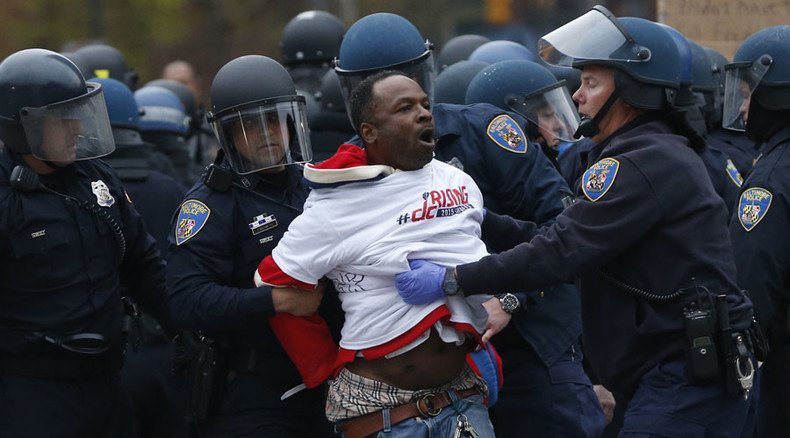Police misconduct lawsuits cost taxpayers, not cops, millions

From big cities to small towns, American taxpayers are footing the bill for police gone rogue. When an officer or department is sued for police brutality or an in-custody death, the municipality is the one to pay up. And it’s costing taxpayers millions.
Property taxes that would otherwise be used for schools, recreation centers, fixing potholes, cleaning up graffiti and other problems are instead being spent on lawsuits and settlements claiming police abuse or neglect.
Inkster, an impoverished suburb of Detroit, Michigan, is issuing a one-time property tax assessment of nearly $200 levied on its residents’ properties... to cover settlements in police brutality cases, RT’s Manila Chan reported.
One of those lawsuits involved Floyd Dent, a 57-year-old African-American man who was driving home one evening in January when he was pulled over and badly beaten by Inkster Police Department. The incident was all caught on the officer’s dashboard camera. Losing the lawsuit is costing the suburb nearly $1.4 million ‒ the largest settlement on local record.
It’s a payment that Inkster, which has been on the brink of insolvency since 2008, can’t afford ‒ hence the property tax. But its residents can’t afford the $192 payment per property this month, either. In Inkster, the median home value is hovering around $55,000, the median household income is just over $26,000 and 38 percent of residents live below the poverty line.
"It’s a stark reminder that police brutality has real consequences, not just for the victims who are physically hurt by it, but for the residents of the community that the police are supposed to be serving,” Dan Korobkin of the American Civil Liberties Union’s Michigan chapter told local press.
Don't cry for me: Police settle #Ferguson protesters’ lawsuit, agree to restrict teargas use http://t.co/fCacrwgEWOpic.twitter.com/q7xuZPgXjy
— RT America (@RT_America) March 28, 2015Inkster is far from the only small town having to find ways to pay for police brutality and in-custody death settlements. On Monday, Snohomish County, Washington authorized a $620,000 payment to the family of Michael Saffioti, 22, who died of an allergy at the county jail three years ago. But the relatives say the actual settlement amount is four times higher, the Everett Daily Herald reported.
“There was a global settlement discussed of $2.4 million,” the family’s attorney, Cheryl Snow, said. “The plaintiffs are concerned about the gross misrepresentation of the amount that’s claimed to be paid by Snohomish County and its insurers.”
Not all costs associated with police brutality or neglect that leads to someone’s death while in custody are monetary, though.
New Mexico man awarded $1.6 mln after cops subjected him to illegal anal probes http://t.co/4dXZbhMZ27
— RT America (@RT_America) January 17, 2014“One hidden cost: The perception that officers are violent can poison the relationship between residents and police,” the Baltimore Sun’s Mark Puente wrote in September, noting a trend of city police brutally mistreating residents, especially those in the poorer communities. In April, tensions in Baltimore broke out into unrest and riots after the in-custody death of Freddie Gray. The six officers involved in his arrest were all charged with crimes, up to and including second degree depraved-heart murder, after the state’s attorney ruled Gray’s death a homicide.
According to the Sun’s six-month investigation into lawsuits, Baltimore paid some $5.7 million to more than 100 people in court judgments or settlements for lawsuits claiming police brutality and civil rights violations over the course of nearly four years. Payouts were capped at $500,000 per case, unless there were extenuating circumstances like multiple victims or actual malice. The city paid an additional $5.8 million in legal fees in defending the police in those cases.
In New York City, the death of Eric Garner after a police officer put him in a banned chokehold last summer has led to repeated protests. Two weeks ago, the city agreed to pay his family a total of $5.9 million to settle their wrongful death claim. It’s not the only chokehold lawsuit the New York Police Department has had to settle, either. In January, the city agreed to pay $75,000 to a man who was arrested using the procedure in 2013.
Connecticut cops pay $3.5 million after killing unarmed man in SWAT raid - http://t.co/HFZgfDeeCO
— RT America (@RT_America) February 22, 2013Between 2009 and October 2014, the city paid out $428 million to settle more than 12,000 civil rights lawsuits against the NYPD. Not all of the cases appear to have involved police misconduct, however. The largest payout of $11.5 million went to Google engineer Sasha Blair-Goldensohn, who was nearly killed in 2009 when a tree branch fell on him in Central Park. Another large settlement went to the family of Ronald Spear, who died after being beaten by Rikers Island guards – officials who work for the Department of Corrections, not the NYPD.













